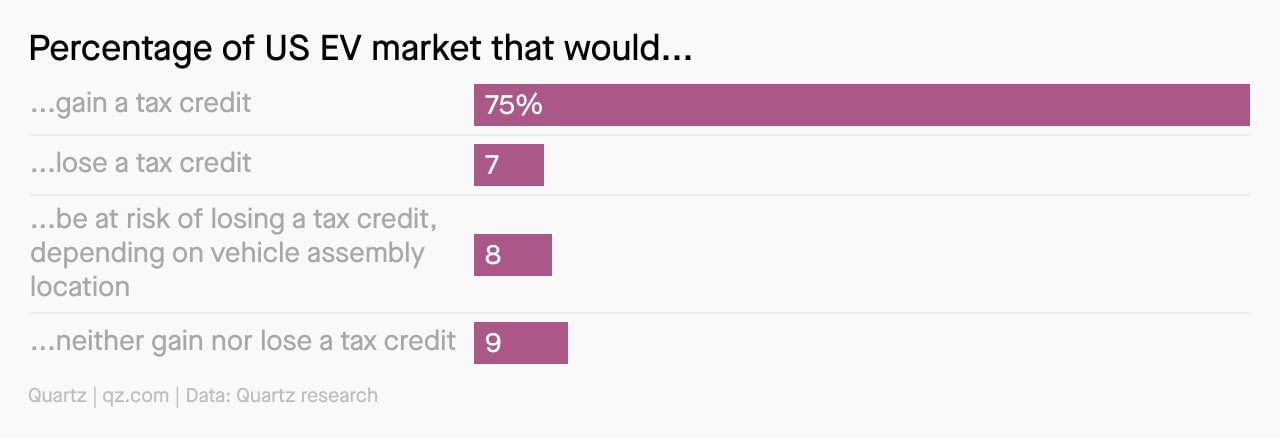🌍 Students skip the US
Plus: EV tax credits are complicated.

Good morning, Quartz readers!
Here’s what you need to know
Chinese student visas to the US plunged. Numbers dropped over 50% in the first half of 2022 compared with before the pandemic as preference for study abroad has pivoted elsewhere.
France enlisted five countries to help put out a wildfire. The blaze is the latest to be recorded in Europe amid a heat wave that has caused a mass fish die-off as rivers dry up. The UK is also on the cusp of declaring a drought.
McDonald’s will reopen restaurants in Ukraine. The fast food giant’s decision follows rival Yum Brands’ reopening of its stores in the war-torn country.
China’s leading chipmaker reported higher-than-expected earnings. Despite US sanctions, Semiconductor Manufacturing International Corp. reported $514.3 million in net income in the second quarter.
Ryanair said the time of cheap flights is over. CEO Michael O’Leary stated the average fare price would rise from about $40 (£33.75) to $50 (£42.25) over the next five years amid rising fuel costs.
BlackRock launched bitcoin offerings. Bitcoin’s price rose after the world’s biggest asset manager enabled institutional clients to invest directly in the cryptocurrency.
Seoul announced a ban on basement flats. Record floods this week killed four people living in underground apartments like the one depicted in the film Parasite.
What to watch for
China’s telecommunications sector is having a good year. China Mobile and China Unicom, two of the nation’s “big three” telephone companies, reported strong and stable revenue growth (pdf)—12% and 8.3%, respectively—in the second quarter of the year.
From January to May, the sector brought in $94.6 billion in revenue, driven by emerging tech like cloud computing as well as 5G services, according to China’s Ministry of Industry and Information Technology.
There’s no sign that growth will slow. Through 2025, Beijing has laid out steps to increase the GDP share of its digital economy by 10%. As other industries struggled amid zero-covid policies, China’s telecoms industry managed to beat pre-pandemic gains with Internet-based services.
The global race to develop 6G networks may still be years away, but China claims to have a strong start thanks to a research breakthrough earlier this year.
Egypt needs cash more than gas
Earlier this week, Egyptian prime minister Moustafa Madbouly said the country will begin rationing electricity as it seeks to increase natural gas exports and draw in foreign currency, capitalizing on the global energy deficit.
Egypt has raked in $3.9 billion in gas exports in the first four months of 2022, and recently struck a deal with Israel and the EU to increase energy exports in exchange for $103 million in food aid. As the world’s largest wheat importer, it has struggled to secure grain following Russia’s invasion of Ukraine—another reason to swap gas for cash.
Historically, the nation is not a big player in the liquified natural gas (LNG) market, accounting for only 3.2% of global supply at peak production, but it currently has export capacity to spare. As electricity prices in Europe skyrocket, spurring cuts and planned blackouts, Egypt has great potential to profit and shore up its forex reserves.
New EV tax credits are just a bit complicated
If the Inflation Reduction Act becomes law in the US, it would make some of the best-selling electric vehicles, such as the Tesla Model 3, Tesla Model Y, and Chevy Bolt, eligible for a sweet $7,500 tax credit in 2023.
To qualify for the credit, the EV has to be assembled in North America, and its price must fall under certain caps, among other restrictions. That means no credits for cars like the Audi e-tron, Porsche Taycan, and Hyundai Kona Electric. Still, the EVs that accounted for 75% of sales last year in the US would qualify…at least until a contested battery sourcing requirement takes effect.

✦ The intricacies and implications of the Inflation Reduction Act will be explained in the next Weekend Brief. Get this exclusive email by becoming a member. Take 40% off when you sign up today!
🧐 Sustainability is the wrong goal for businesses that care about climate change
Surprising discoveries
Firefighters battled a fire tornado in California. And you thought wildfires were scary enough.
An Indian man won a 22-year court battle to be reimbursed for an overpriced train ticket. The sum in question was 25 cents.
The pandemic has changed how we hear words. You’re a lot more likely to hear “mask” than “task” thanks to face coverings becoming more commonplace.
In the future, we’ll live among the clouds. That is, if these seashell-shaped floating pods show their design promise once built.
Sorry TikTok, YouTube is still the No. 1 social network among teens. Long-form video content remains popular despite the rise of short clips.
Our best wishes for a productive day. Send any news, comments, persistence for petty feuds, and pod decor to [email protected]. Reader support makes Quartz available to all—become a member. Today’s Daily Brief was brought to you by Sofia Lotto Persio, Julia Malleck, Tim McDonnell, and Morgan Haefner.